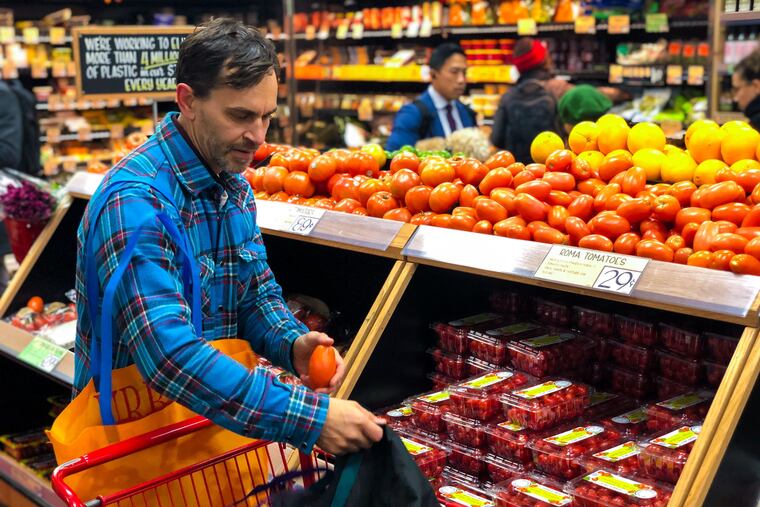Want to actually remember your reusable shopping bags? Here are 8 tricks that work
Never forget your totes again...

A growing number of cities are banning or charging fees for disposable shopping bags, and Philadelphia is trying (for the fourth time) to join them. Last month, the Licenses and Inspections committee voted for a bill prohibiting retailers from providing single-use plastic bags to customers. (The bill is currently awaiting a vote of the full Council.)
Plastic bags are the fifth most-littered item in the city, according to the city’s 2018 litter index, making them a headache for city workers, an eyesore for residents, and a detriment to the environment.
“Philadelphians use nearly a billion plastic bags every year, which costs us between nine and 12 million dollars in taxes, and hundreds of municipality hours to clean them up,” says Logan Welde, director of legislative affairs at Clean Air Council.
While the impact of plastic is indisputable, making the switch to reusable bags isn’t always as simple as it sounds. (How many times have you brought along a few totes only to accidentally leave them in the car?) Here are eight strategies to make the transition stick.
Invest in bags that fold or roll up.
Many brands, like BeGreen, Reger, and Flip and Tumble, sell lightweight bags that fit into a carrying pouch the size of a wallet. Buy a few to keep your jacket pockets or purse stocked at all times. For heavier loads, consider BagPodz, a drawstring sack that carries and conceals 10 reusable bags, with a carabiner to easily clip it to a backpack.
Make it a mantra: keys-phone-wallet-bags.
Every time you leave the house, add reusable bags to your necessities checklist. It won’t feel automatic at first, so coach yourself by placing your house keys on top of a reusable bag whenever you walk in the door. As you exit, the two essentials will already be paired up.
Stock the places you frequent with at least two reusable bags.
Most of us have acquired a few complimentary cloth bags from event or store giveaways over the years. Pull them out of the closet and keep them where they’ll be put to regular use. Whether it’s your office, gym, or car, keep at least two bags everywhere you spend time regularly.
Put your bags back after you unpack.
Say that rhyme five times, and cement it into your mind. After shopping, it’s crucial to return the bags to their original location so that they’re ready for next time. With your car, make it a habit of putting them back immediately. If returning elsewhere, hang the bags on your front doorknob, so you see them before your next outing.
Start all your shopping lists with “bags.”
Make yourself written reminders: Put a sticky note on your fridge; if you’re a list-maker, add bags to your lists. Not only will it act as a visual reminder, but studies show that writing down new information helps us commit it to memory.
Set calendar reminders.
Do you grocery shop on the same day every week? If so, set a standing calendar alert to remind you to bring your bags. Likewise, set your morning alarm to flash “bags” across your phone screen.
Let your kids pitch in.
If you have little ones in the family, task them with bag-reminder duties. Nagging kids can sometimes be good motivators.
Forget your bags? Roll your cart to your car.
Once you reach the register, you can’t always abandon your cart to run out to the car to grab a forgotten bag. Instead of surrendering to plastic, tell the cashier you’ll be doing the bagging from the trunk of your car and want to place each item back into your cart.